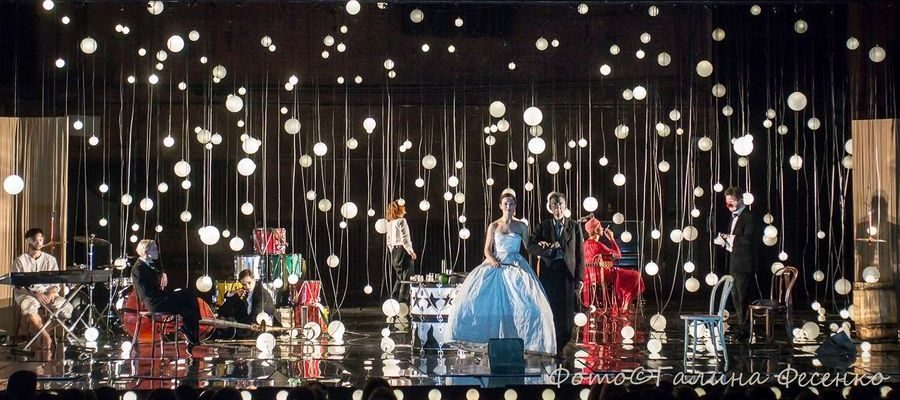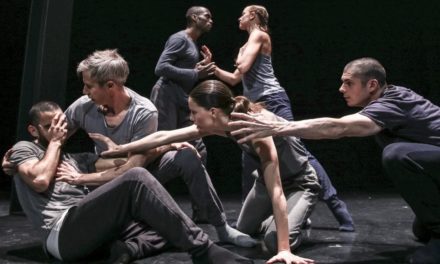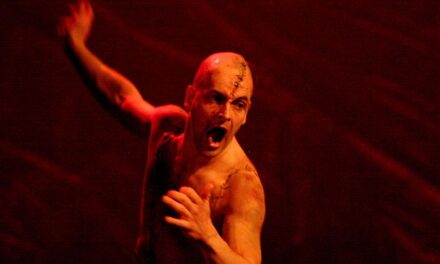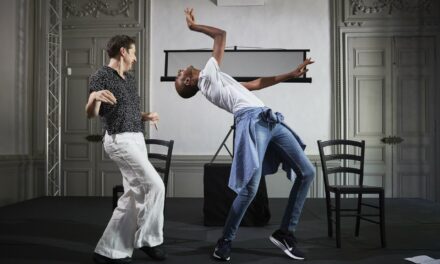Yury Butusov premiered his new production of Brecht at the Pushkin Theater, which is fated to become one of the season’s biggest hits.
Tickets for Drums in the Night at the Pushkin Theater were sold out long before the premiere, and people were standing in the balconies at the first performances—and that is to see a little-known play by Brecht that has had little luck on the Moscow stage (it passed by practically unnoticed when staged at Et Cetera Theater around ten years ago). That said, even if Yury Butusov were to perform the phone book, the theater would be packed.
Moscow’s theater-going public loves this director like no other and to the point of adoration. They love him for his expressiveness, for his open emotions, for the ecstatic dances and the rock-concert energy of his performances, which you’ll find nowhere else. All of this, to the delight of his followers, is to be found in his new production. It could even be said that Butusov has staged his ideal play: it is not restrained and cautious, like his first production at the Pushkin Theater, The Good Person of Szechwan, nor is it wildly chaotic like, say, Macbeth. Cinema at St. Petersburg’s Lensovet Theater. Drums, moreover, is not six hours long, like his unforgettable Seagull, but a humane three and a half.
In short, this is classic Butusov “Brecht cabaret”: a half-empty, at times naked-to-the-bricks stage with a drum set in the middle; remarks on neon signs that descend from the fly loft; an undefined setting; characters who look like freaks; and a great, great deal of music (a full list of the compositions would take up half of the playbill, so they modestly wrote “Soundtrack by Yu. Butusov”). In the first act, it seems that there is even too much of this disco-to-the-beat-of-Prodigy, where the actors pulsate as if beneath an electrical current. But the actors move spectacularly, and here choreographer Nikolai Reutov must be given due credit. The director, it seems, needs to warm the audience up to a certain temperature and to prepare its perception in order to then stun it with images of unbelievable vision.
Drums in the Night is a relatively short, early Brecht play about a soldier who has returned from war to his beloved, who has not waited for him and become engaged to another. But it is not a social message about the unjust structure of society that attracts Butusov to the work. Indeed, war and revolution in the Newspaper District exist on the periphery of his production. In the foreground lie human despair, fear, love, loneliness, and restlessness in a vast and indifferent world.
The director manages to chisel out powerful emotions with basically simple means: in the beginning of the second act, the characters move in a single row from the depths of the stage, and a wind beats at their jackets and dresses with ever more strength. Then it suddenly dies down, and they gently sway to and fro like hanged men in nooses…An image so terrible it raises hairs. The tragic pantomime of the failed fiancé who buries his imaginary, yet unborn child because his bride wants to get rid of the unwanted offspring is similarly striking. When from above, like manna from heaven, illuminated spheres descend and lie on the stage (scenic designer Aleksandr Shishkin is at his usual best), the audience, counter to Brecht’s precepts, loses its capacity to analyze anything and turns into one utterly enraptured “ah.”
But the greatest success of the production is the ensemble of actors, in which even supporting roles such as the waitress Manke, as performed by Anastasia Lebedova, are small masterpieces, to say nothing of the leads. In the role of Anna, Aleksandra Ursuliak is a black and white swan at the same time, a luxuriant femme fatale and ridiculous clown in one. Unbelievably flexible, with a hoarse, seemingly torn-off voice, confused and alluring, she is without a doubt the tuning fork for the play. Aleksandr Matrosov plays her fiancé Murka, who appears to be a slick and loutish businessman, but is, in fact, an insecure former worker who still feels the instability of the earth beneath his feet and the fickleness of good fortune. It seems as if he is even constantly pointing to in his new boots to convince himself that “you, young man, are worthy of this…” Timofei Tribuntsev joins the cast by courtesy of the Satiricon Theater, where he was superb as Iago in Butusov’s Othello. He proved to be an excellent candidate for the role of Kragler, the soldier who has returned from captivity in Algeria battered by life and covered with unseen sores.
There is something of Büchner’s Woyzeck in him—the obedience to fate, the trampled pride of the “little man” and the desire for vengeance, which pushes him toward the barricades. But fits of revolutionary passion are forgotten as soon as his beloved woman returns to him. The former warrior puts on a jacket and round spectacles and amazingly starts to resemble Bertolt Brecht. The parallel is only intensified when he reads Pasternak’s poem, “I want to go home into the hugeness/of the apartment suggestive of sadness” (“Mne khochetsia domoi, v ogromnost’/ kvartiry, navodiashchei grust'”). This is a writer who, in the midst of the convulsions of history, dreamed of his quiet work desk and of a boring, peaceable life.
Brecht himself took part in the November Revolution of 1918, but he quickly grew disillusioned with politics and occupied himself with literature, specifically—with Drums in the Night. He was later dissatisfied with the play, reworking it and condemning the petite-bourgeois behavior of his hero, who preferred individual happiness to class interests. Butusov, however, does not share this opinion. He delights in the playwright’s vivid, expressionistic, not-fully-catalogued colors as depicted in Egor Peregudov’s new translation. In the end, he simply sings a hymn to the average man. Though fires burn and buildings collapse in the frames of a newsreel, the hero and his newfound family will sit peacefully before the television…Fight your wars without us…If, at this moment, someone in the audience should become nobly indignant—But what about the struggle with the forces of darkness, criminal government, etc.?— the director quickly puts them in their place, rolling the play’s credits on the backcloth. We are, after all, ourselves sitting before a screen/stage and spending our time pleasantly. So be it that somewhere in the night drums are being beaten— they are not beating upon us…
Translated by Adrien Smith
This article was originally published in the journal Teatral. Reposted with permission.
This post was written by the author in their personal capacity.The opinions expressed in this article are the author’s own and do not reflect the view of The Theatre Times, their staff or collaborators.
This post was written by Marina Shimadina.
The views expressed here belong to the author and do not necessarily reflect our views and opinions.


















